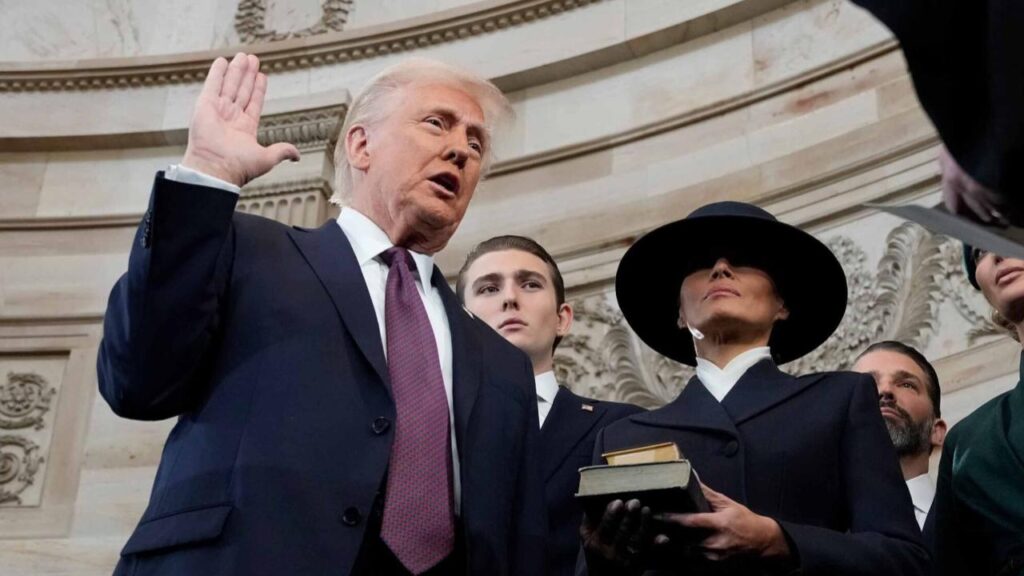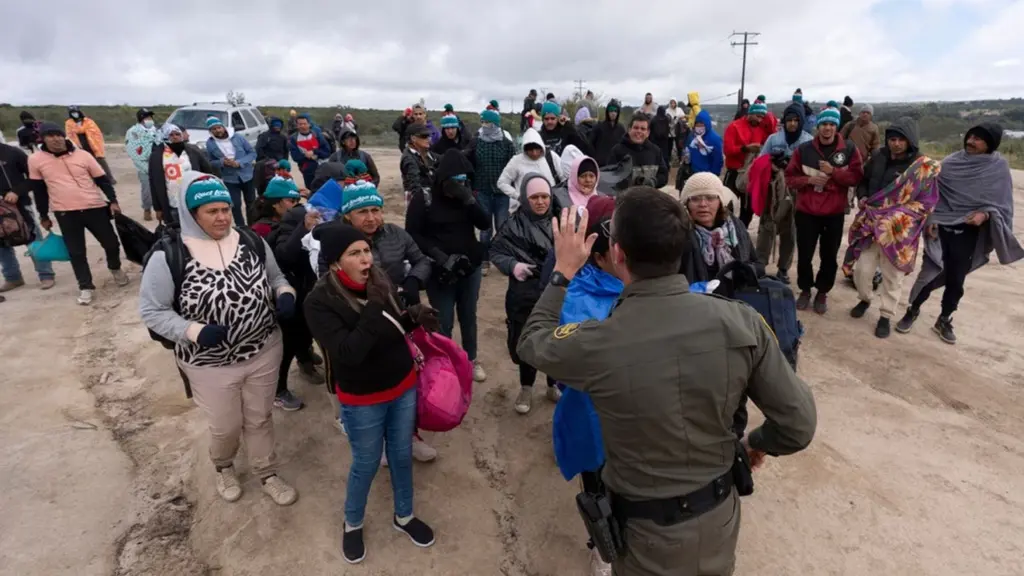In a controversial move, former President Donald Trump has rolled out a new immigration rule that could financially devastate undocumented immigrants living in the U.S. The new regulation introduces hefty fines for those who are found to be in violation of their immigration status. The idea behind these fines, according to Trump and his administration, is to increase pressure on undocumented immigrants to leave the country voluntarily. But what does this rule mean for undocumented individuals, and how will it impact immigration policy? Let’s dive in.

Trump’s New Rule Slaps Undocumented Immigrants with Massive Fines
| Takeaway | Stat/Fact |
|---|---|
| Massive fines are coming for undocumented immigrants. | Fines could range up to $500 per day for staying unlawfully in the U.S. |
| The rule could affect millions of undocumented immigrants. | There are an estimated 11 million undocumented immigrants in the U.S. |
| The fines aim to force voluntary departure. | Trump’s administration claims that the rule will prompt immigrants to leave on their own. |
Trump’s new rule is certainly a bold step in the ongoing debate about immigration reform. Whether it’s effective in forcing undocumented immigrants to leave or simply adds more challenges to an already broken system remains to be seen. One thing is clear, though—this policy marks a dramatic shift in how the U.S. handles its immigration problem, and its implementation will likely have a far-reaching impact on families, businesses, and communities across the nation.
For now, undocumented immigrants should stay informed and seek legal advice about their options. In this ever-changing landscape, staying one step ahead is crucial to navigating the complexities of U.S. immigration policy.
What the New Rule Entails
Under Trump’s new rule, undocumented immigrants could face fines for each day they remain in the country unlawfully. The fines start at $100 per day for a first violation, escalating to $500 per day for those who have been in the U.S. without legal authorization for extended periods. The fines are designed to apply both to individuals and to businesses that employ undocumented workers.
While the rule officially targets undocumented immigrants, its broader effects could ripple through various sectors, including businesses, schools, and social services that engage with immigrant communities. Trump’s administration is framing the policy as a way to make staying in the U.S. too costly, essentially pushing undocumented individuals toward voluntary departure.
For context, fines are not a new concept in immigration policy, but the scope and scale of Trump’s proposal make this a game-changer. By imposing daily fines, this rule could result in penalties that quickly pile up—putting financial strain on immigrants already struggling to make ends meet.
Why Now? The Motivation Behind the Rule
For years, Trump has made immigration a cornerstone of his political rhetoric. This new rule aligns with his broader “America First” agenda, which emphasizes stricter border control and a crackdown on illegal immigration. Trump believes that by financially burdening undocumented immigrants, his administration can force them to leave the country without the need for lengthy deportation processes.
This approach is also seen as an attempt to deter new immigrants from trying to enter the country illegally. The rule sends a message that staying in the U.S. unlawfully is not only dangerous due to the potential for deportation but now carries severe financial consequences.
Trump’s advisors argue that these fines will promote self-deportation, a policy that has been used in the past with mixed results. However, critics of the rule argue that it’s yet another punitive measure targeting vulnerable populations and could lead to exploitation by unscrupulous employers and landlords.
The Potential Impact on Undocumented Immigrants
If implemented, this rule could devastate the lives of millions of undocumented immigrants who are already struggling to survive. Many of these individuals have lived in the U.S. for years, often raising families and working in essential industries like agriculture, construction, and service jobs.
The Financial Toll: For many undocumented immigrants, the daily fines could quickly become unmanageable. With penalties escalating over time, a family of four could face hundreds of thousands of dollars in fines, a sum they would have little hope of paying. This would only push more people into financial distress and potentially lead to even greater reliance on informal or underground economies.
Fear of Retaliation: With the added threat of fines, undocumented immigrants could become even more fearful of interacting with government officials. Many already avoid seeking medical care, police assistance, or reporting crimes due to fear of deportation. Now, the looming threat of significant financial penalties could drive even more individuals into hiding, making it harder for authorities to monitor the population.
Impact on Communities: Undocumented immigrants play a vital role in the U.S. economy and culture. They work in industries that many native-born Americans don’t, helping to sustain sectors like agriculture, healthcare, and hospitality. Should these individuals be forced to leave due to financial pressure, communities across the nation would feel the impact.

Reactions to the Rule: A Divisive Issue
As expected, the new rule has sparked intense debate. Supporters of the rule argue that it is a necessary step in securing U.S. borders and deterring illegal immigration. They believe that by imposing financial penalties, the U.S. government can reduce the number of people living in the country without proper documentation, leading to fewer public resources being used by undocumented individuals.
On the flip side, opponents of the rule view it as a cruel measure that targets vulnerable populations already struggling with poverty, fear, and exploitation. Immigrant advocacy groups have raised concerns that the fines will disproportionately affect families who have lived in the U.S. for years, including children who were born here and have no say in their parents’ immigration status. The policy could potentially separate families as financial strain forces individuals to leave the country.
Additionally, critics argue that this approach is a form of collective punishment, holding individuals accountable for systemic issues in immigration law. The sheer scale of the fines might also create an incentive for employers to exploit undocumented workers further, knowing that they cannot afford to challenge the financial burden.
The Legal Landscape and Challenges Ahead
Legal challenges to Trump’s new rule are already underway. Critics argue that the policy may be unconstitutional and violate human rights protections. In addition, some immigration experts question whether it will hold up in court.
Unclear Enforcement: One of the significant concerns surrounding the new rule is how it will be enforced. The U.S. immigration system is already overloaded with a backlog of cases, and adding fines to the mix could further complicate the process. Additionally, the costs associated with enforcing the rule, including the administration’s need to track down violators, could strain government resources.
Potential for Loopholes: Like many immigration policies, this rule could create opportunities for exploitation. If an undocumented immigrant is unable to pay the fines, they may be subjected to additional legal consequences, including criminal charges or indefinite detention. Furthermore, some worry that the fines will lead to more people trying to go further underground, making it harder for authorities to manage immigration enforcement.
FAQs
What are the penalties for undocumented immigrants under Trump’s new rule?
The rule imposes fines that can start at $100 per day and rise to $500 per day for extended periods of illegal stay. These fines apply to both individuals and businesses employing undocumented immigrants.
Will this rule affect families with children born in the U.S.?
Yes, families who have been in the U.S. for years may face severe financial consequences. Children born in the U.S. will not be affected by the fines themselves, but the financial strain on parents could lead to family separations.
How are immigrant rights organizations responding to the new rule?
Immigrant rights groups are strongly opposed to the rule, arguing that it disproportionately targets vulnerable individuals and could force families into even more precarious situations.






